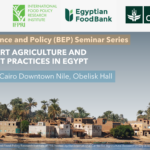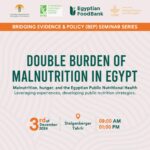The International Food Policy Research Institute (IFPRI) and the International Water Management Research Institute (IWMI) are convening a policy workshop that will gather government agencies engaged in shaping Egypt’s food, water and social protection policies.
BEP Seminar Series: Climate-smart agriculture and development practices in Egypt
Egypt stands at a critical juncture, facing significant environmental stresses exacerbated by climate change, despite being a relatively minor contributor[1] to global greenhouse gas emissions. The nation’s already hot and arid climate is experiencing increasing average temperatures, with projections indicating continued increases. Climate change significantly impacts Egypt’s agricultural sector[2], a vital contributor to the country’s GDP, foreign cash reserves, food security, and employment. Absent adaptation, rising temperatures, increased land salinity due to rising sea levels in the Nile Delta, limited surface water resources and rapid exploitation of groundwater resources will reduce agricultural productivity in the future.
BEP Seminar Series: Malnutrition, Hunger, and the Egyptian Public Nutritional Health
Egypt is among the countries confronting the simultaneous challenge of both undernutrition and overnutrition. Around 14% of the Egyptian population experience food insecurity, with the country ranking 57th out of 121 nations on the 2023 Global Hunger Index. This position indicates a moderate incidence of hunger. Moreover, approximately 40% of Egyptian adult population is obese, while around 18% of children under the age of 5 are obese and 22% are stunted (impaired growth, short for their age). This co-existence of multiple forms of malnutrition is known as the double burden of malnutrition, a compounding issue for Egyptian public health & safety.
BEP Seminar Series LAUNCH EVENT: Impact Evaluation of Social Protection Programs
Event Summary Blog By Sarah Shnouda, Adham Hamdy, and Dalia El Sabbagh Introduction The Middle East and North Africa (MENA) region is witnessing a decline in food security due to the repercussions of the wars in Ukraine, the war in Sudan, the protracted crises in Yemen, and the state of global inflation of food prices, […]
2022 Global food policy report: Climate change and food systems: Synopsis
Climate change is a growing threat to our food systems, with grim implications for food and nutrition security, livelihoods, and overall well-being, especially for poor and vulnerable people around the world. The imperative for urgent action on climate change — both to achieve the major emissions reductions needed to limit global warming and to increase adaptive capacity and resilience — is drawing global attention





